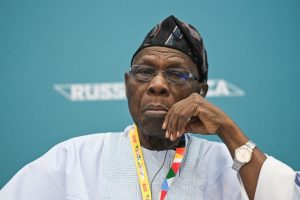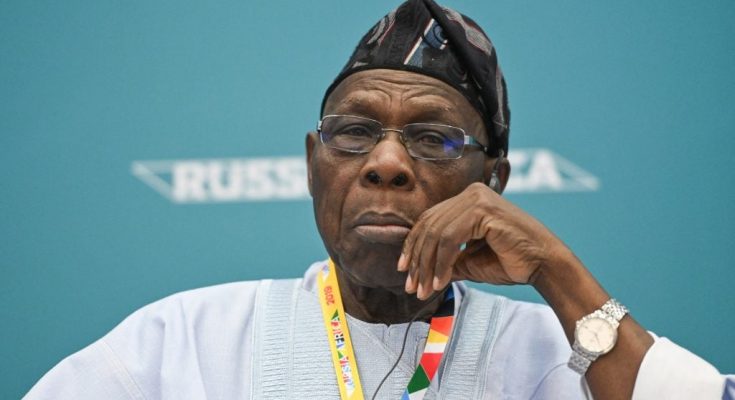


Former President Olusegun Obasanjo has called on older politicians to step aside but work closely with younger leaders in powerful positions to fashion ways to tackle Nigeria’s insecurity.

Obasanjo, who made the call when he spoke at the 2022 Murtala Mohammed Foundation Annual Lecture in Abuja on Monday, stressed that the continued violence and insurgency across the country required urgent attention.
This is even as Governor Kayode Fayemi of Ekiti state called for a new social compact between the government and the rest of the society to secure the citizenry.

The theme of the event was ‘Beyond Boko Haram: Addressing Insurgency, Banditry and Kidnapping Across Nigeria’

Speaking, Obasanjo insisted that tackling Nigeria’s security challenges must begin from the roots to secure a permanent solution,
According to him, until the twin menaces of out-of-school children and youth unemployment were resolved, every other approach to tackling the country’s precarious security situation would remain a cosmetic affair.
Giving a historical perspective to the security challenges in the country, the former president said: ”Nigeria’s insecurity started immediately after the civil war, because of the ease with which people could have access to weapons, and we have never come out of it since then. The situation has grown from bad to worse.
“In 2011, when Boko Haram was showing its ugly head, I went to Maiduguri to find out a little bit more about Boko Haram and what their objective was. The insurgents said they were interested in Sharia, but they also complained that their followers had no job, and in their efforts to do something about getting legitimate income to help their followers, the government started chasing and gunning them down.
“What I feared at that time seems to have been happening because, in 2011, Boko Haram had not much of external connection. In fact, the intermediary who was helping me to reach out to them felt maybe 10 to 11 per cent external connection they had at that time. And that external connection would be Nigerians who have some resources abroad.
“My fear was; could we be able to get them away from Al-Qaeda and other international terror organizations? We seem not to have been able to do that. Today, Boko Haram and those who have come to work with them are making the matter much worse than it was 11 years ago.”
Out-of-school children
Obasanjo decried the rising population of Nigeria’s out-of-school children and called on the federal and state governments to put structures in place to tackle the menace
“If the population of Nigeria today stands at 215 million and 15 million children are out-of-school, it doesn’t matter how we deal with Boko Haram, banditry and kidnapping – either by a stick or by carrot approach – those 15 million children that should be in school, but are not in school are the potential Boko Haram of 10-15 years from now.
“I believe it is not late to start and say to ourselves ‘we do not want the Boko Haram of 2030 or 2035’. But if we don’t do anything about those 15 million out-of-school children, we are already in more trouble with Boko Haram of the future.
“And if we do not do anything about the 15 million children that should be in school that are not in school, then we are already nurturing the Boko Haram of tomorrow.
“When you look at some of the things we are doing, then you wonder why we are not succeeding. It is because we are doing the same things all the time (and expecting a different result).
“People want a good life, a good job, and they must be given a good education. As long as they are denied these, they will be right to make demands on society. We, the society, must be willing to give it to them or they extract it from society unwillingly.
“Education should be first priority because if we are not able to take care of education, we cannot be able to take care of other things,” he said.
Inter-generational collaboration
The former president, however, disclosed that he was shocked to hear that some political leaders who are well advanced in age were interested in contesting for elective offices in the forthcoming general elections.
This, he argued, was an aberration that would throw a spanner in the works for an end to insecurity in the land.
Obasanjo said, “We also talk about intergenerational collaboration. Governor Fayemi you talked about being in junior secondary school when Murtala-Obasanjo were in power.
“If Murtala-Obasanjo and people of their age still have to compete with you as governor, then something is wrong with the Murtala-Obasanjo group.
“They (old politicians) should be setting aside and sharing their knowledge and experience to you and you should be giving it to those coming after you so that we make sure that the experiences we have, we are able to give it to you, and you should be able to start giving it to those coming after you.
“That way we can make sure that the experiences we have (accumulated), we are passing it down to those of you coming behind rather than to start competing with you. This is necessary to make sure you have access to what you can use to make Nigeria better than you found it.”
Economy
Obasanjo also regretted that the investment and development cannot take place in a chaotic atmosphere because investors would be unwilling to invest in such places.
“We seem to be treating symptoms rather than the disease. We have about 215 million Nigerians, and most of them – about 65 per cent – are under 30 years of age, most of whom are unemployed. This is an issue we have to face and deal with. Our economic situation today is lamentable. This, we also have to do something about.”
Nation-building
The former president stressed that the government needed to deepen the conversation regarding nation-building and follow through with necessary action to help the nation survive the effects of insecurity and poverty.
“For me, can’t go anywhere until we take nation-building seriously. Unfortunately, we are not taking it seriously. Until we move Nigeria from being a country to be a nation, we are not going to go far. Justice and equity are necessary for building a society where everybody feels a sense of belonging.
“You can say that we were idealistic and naive, but one thing you always say of us is that we were committed Nigerians. I believe we still have committed Nigerians, but they need to come out and be counted; then we will be able to deal with Boko Haram, banditry, kidnapping, and mass abductions across Nigeria.”
Social compact
Also, Governor Fayemi stated that an all-encompassing social compact had become an urgent imperative in Nigeria’s quest to look beyond Boko Haram towards an all-around national rebirth.
According to him, “Looking beyond Boko Haram, the clarion call to us as Nigerians is clear: In the face of a broken socio-economic fabric that has generated so much anguish, despair, and distrust among us, we must step back and summon that Nigerian genius that is innate in us in order to reimagine our country and reinvent our vision of oneness.
“To do this, it is evident to me that the time has come, and it cannot be postponed, for a new compact to be forged between state and society whose centrepiece must be an inclusive and expansive project of human security in our land.
“Clearly, the leadership in the most affected state in the North East has been up to the task in terms of its response to forging a new compact between state and society. Yet, in spite of the best efforts of my brother, Governor Babagana Zulum and his government following in the footsteps of former Governor Kashim Shettima, it’s clear that what is required is a comprehensive national response, not an isolated state strategy.
“It must go without saying that we have to pay special attention to employment creation on a mass scale so that our bid for socio-economic progress can stand a chance of being achieved.
Earlier, Fayemi described the late General Murtala Muhammad as a charismatic leader whose decisive, no-nonsense, business unusual style captured the imagination of the youths.
“The late Head of State remained an uncommon example of public service through the uncompromising commitment he displayed to the pursuit of the common good,” he added.
In her remarks, the Chief Executive Officer of Murtala Muhammed Foundation and daughter of the late military Head of State, Dr Aisha Muhammed Oyewole, expressed the commitment of the organization to improving the socio-economic development of Africa in line with the ideals of the late Pan-Africanist Nigerian leader, through its programmes.
She said, “We have made notable impacts in the lives of people, especially the marginalised, disadvantaged, and vulnerable in addition to contributing to promoting good governance and empowerment.” Continue Reading









